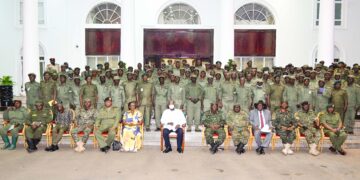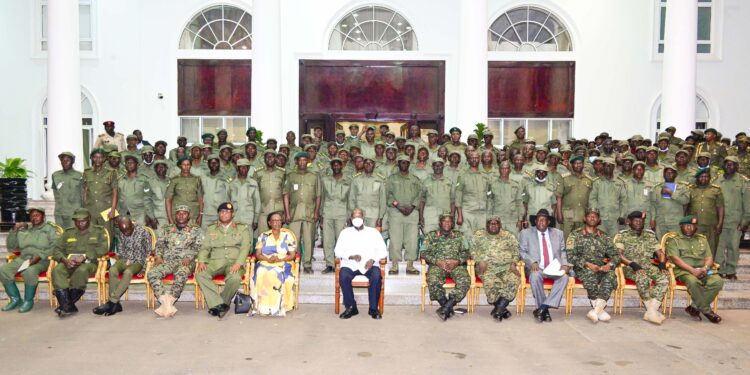President Yoweri Kaguta Museveni has vowed to step up efforts to improve the welfare of veterans who fought in Uganda’s liberation struggles, insisting it is unacceptable for those who risked their lives for the country’s freedom to live in poverty.
“It’s not good to have the veterans in poverty. It’s not good at all,” the President told veterans drawn from Luwero, Wakiso, Nakasongola, Kiboga, Kyankwanzi, and Nakaseke districts.
He made the remarks on Wednesday, September 3, 2025, while delivering a lecture of opportunity and officially closing the Transformational Leadership Course Intake 07/2025 for veteran cadres at State House, Entebbe. His address blended reflections on Uganda’s liberation journey, the ideological foundations of the National Resistance Movement (NRM), and practical measures to economically empower ex-servicemen.
Economic Empowerment for Veterans
The President emphasised that the sacrifices of veterans—many of whom fought in the 1981–1986 liberation war—must be honoured with better economic opportunities. “The ones who are leaving now are going with better packages, but those who sacrificed earlier must be compensated for the shortfalls,” he said. “We shall do this through revolving funds organized at the zone level.”
Museveni urged veterans to form structured associations and Savings and Credit Cooperative Organizations (SACCOs) to enable government support. “We are giving money to the Kampala ghetto boys. Why can’t we give money to the SACCOs of veterans?” he asked.
He further stressed the need to integrate veterans into Uganda’s four key economic sectors—commercial agriculture, manufacturing, services, and ICT—for sustainable prosperity. For those without land, he encouraged trades like maize milling, tailoring, carpentry, and small-scale manufacturing as alternative income sources.
Veterans and Operation Wealth Creation
Reflecting on Operation Wealth Creation (OWC), launched in 2013, President Museveni revealed that veterans were supposed to be the first beneficiaries. “I told General Saleh to first give seedlings to all veteran families and those who supported us during the war. Only after that should others benefit. But I later heard some veterans missed out because they lacked land,” he said.
Museveni also revisited the three historical missions of the NRM, anchored in four principles: patriotism, pan-Africanism, socio-economic transformation, and democracy.
He explained that prosperity stems from producing goods and services for sale rather than dependency. Using his own upbringing as an example, Museveni recounted how his father, Mzee Kaguta, sold cattle in cultural markets in Ntungamo to raise his school fees with the help of traders from outside their tribe.
“That experience taught me that the prosperity of the Banyankore—and any other tribe—depends on broader national and regional markets,” he said.
Why Regional Integration Matters
The President noted Uganda’s surplus production, citing examples: 5.3 billion litres of milk produced annually versus 800 million consumed locally; 5 million tons of maize grown compared to 1 million consumed; and 700,000 tons of sugar produced against a 300,000-ton local demand.
“Without regional and continental markets, our industries would collapse under excess production,” he warned. “That’s why we say we need East Africa, we need Africa for our own prosperity. Pan-Africanism is for your own good.”
Veterans’ Demands and Assurances
On behalf of the veterans, Captain (Rtd) Leonard Settimba presented a memorandum requesting a revolving fund, affordable loans through SACCOs, and an annual national day to honour liberation fighters.
Veterans also expressed fears over land evictions, but Museveni assured them that no one would be displaced as long as they paid busuulu (ground rent).
Brigadier General Justus Rukundo, Commandant of the Oliver Reginald Tambo Leadership School and Pan-African Centre of Excellence (ORTLS-PACEX) at Kaweweta, thanked the President for supporting veteran training. He noted that 15 intakes have been trained so far, with projects underway, including a 20-room guest house named “ANC,” a learning auditorium, and a senior officers’ dormitory.
The event drew several dignitaries, including Hon. Alice Kaboyo, Minister of State for Luwero Triangle and Rwenzori Region; Maj Gen David Mugisha, Commander of the Special Forces Command; Maj Gen (Rtd) Phinehas Kitirima, NRM District Chairperson for Sembabule; Maj Gen James Kiwanuka, UPDF Joint Staff for Human Resource Management; Maj Gen Steven Mugerwa, UPDF 1st Division Commander, and Maj Gen Felix Kulayigye, Director of Defence Public Information.









